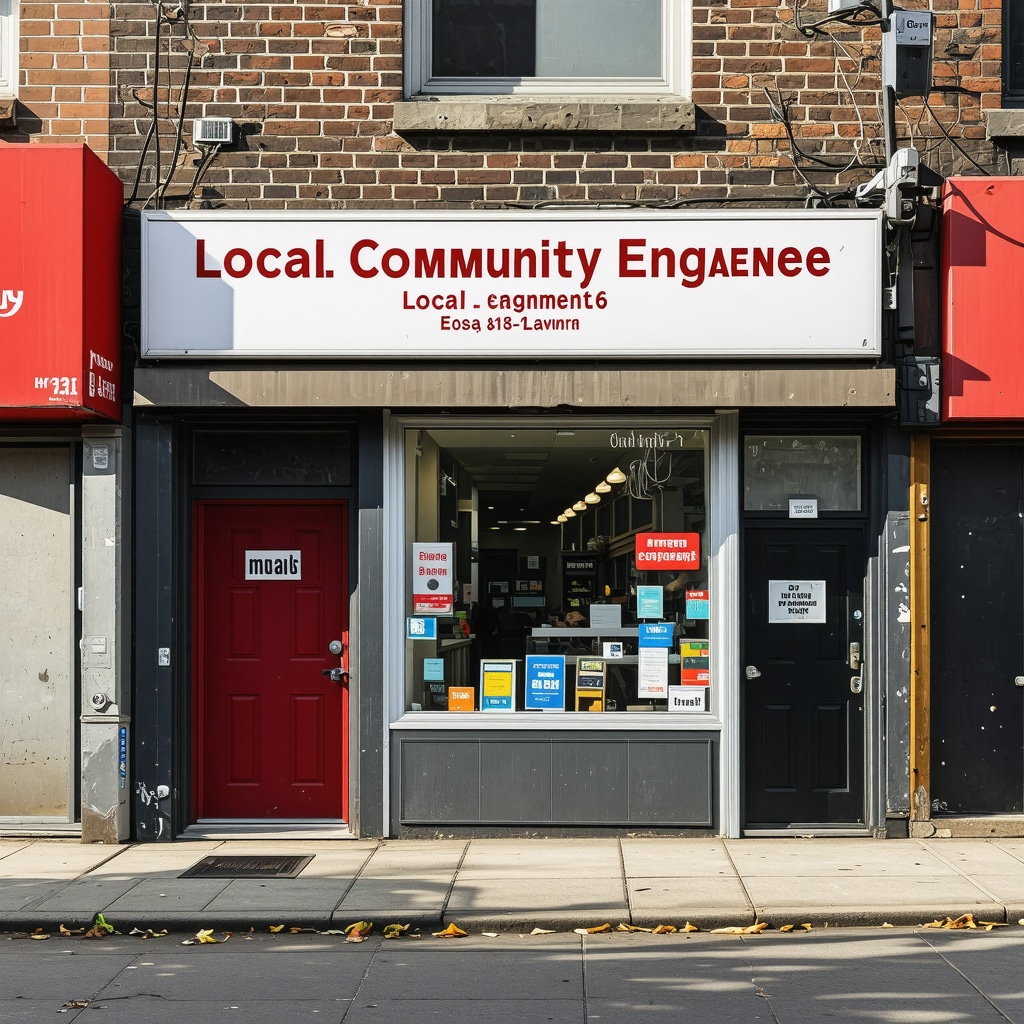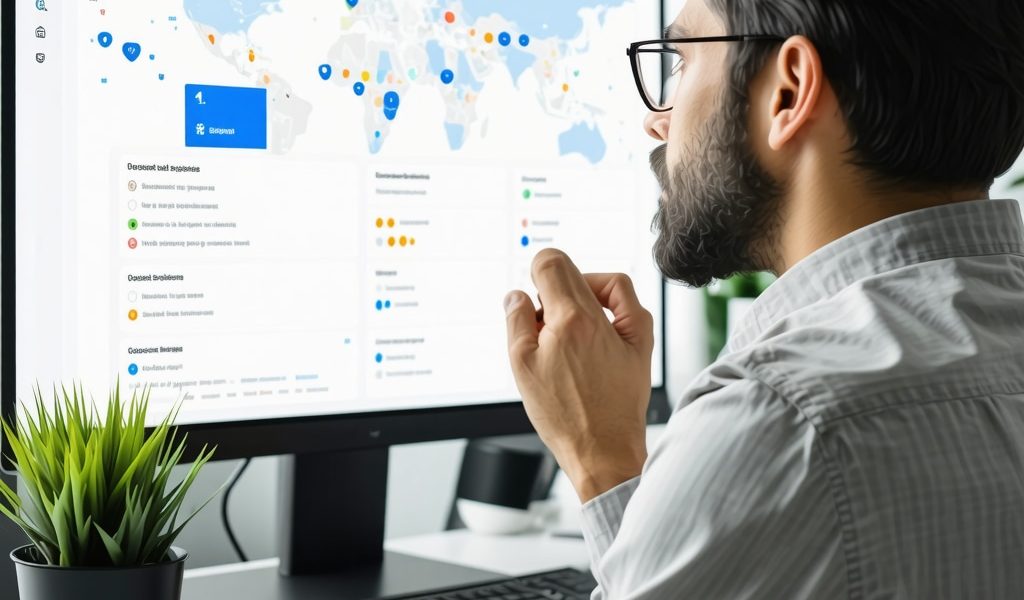The Art and Science of Keyword Optimization in GMB for Dominating Local Search Results
In the fiercely competitive landscape of local SEO, mastering the nuanced application of keywords within Google My Business (GMB) profiles can be a game-changer. As a seasoned digital marketing strategist, I have observed that the strategic integration of relevant, high-impact keywords not only enhances visibility but also solidifies authority in local markets. This article delves into the complex dynamics of keyword utilization in GMB, revealing insights that can elevate your local search rankings significantly.
Understanding the Semantic Core of Local SEO: Beyond Basic Keywords
Effective GMB optimization hinges on a deep comprehension of semantic SEO principles. Incorporating Latent Semantic Indexing (LSI) keywords—terms that are contextually related—enriches your profile’s relevance. For instance, a bakery in Brooklyn should target keywords like “Brooklyn artisan bakery,” “gluten-free bread Brooklyn,” and “custom cake designer Brooklyn”—these variations capture user intent more precisely. Integrating these seamlessly into your business description, services, and posts ensures your profile addresses the complex, layered queries of local consumers.
How to Strategically Embed Keywords for Maximum Impact
Embedding keywords requires a nuanced approach. Prioritize placing primary keywords in critical locations such as the business name (if appropriate), description, and service categories, while maintaining natural readability. Supplement these with secondary keywords in GMB posts, FAQs, and reviews. For example, a landscaping service might incorporate “residential lawn care in Downtown” into service descriptions and use variations like “garden design experts” in posts. This multi-layered strategy enhances topical authority and search engine comprehension, aligning with Google’s evolving algorithms that favor contextually rich content.
Can Over-Optimization Harm Your Local SEO Efforts?
Balancing Keyword Density and Authenticity in GMB Content
Yes, over-optimization can lead to penalties or reduced visibility. Google’s algorithms are increasingly sophisticated in detecting unnatural keyword stuffing. The key is to maintain a balance—use keywords organically, ensuring they contribute meaningfully to the user experience. For instance, instead of repetitive mention of “best pizza in Chicago,” diversify with related terms like “Chicago pizza delivery,” “local pizzerias near Millennium Park,” and naturally include these within engaging narratives. This preserves the integrity of your profile while boosting relevance.
Leveraging Data and Tools for Precision Keyword Targeting
Utilize advanced tools like Google Keyword Planner and third-party local SEO platforms to identify high-impact, low-competition keywords. Analyzing competitors’ profiles and customer reviews can reveal underserved keyword opportunities. Regularly updating your GMB content with these insights ensures sustained relevance and ranking momentum. For example, if customer reviews frequently mention “quick response time,” incorporate this into your service descriptions and FAQ sections to capture voice search queries.
Enhancing Authority Through Content and Citation Strategies
Complement keyword optimization with authoritative content and high-quality citations. Building local citations with consistent NAP (Name, Address, Phone Number) data that contain targeted keywords reinforces your profile’s credibility. Content marketing, such as blog posts or local guides optimized with strategic keywords, further boosts authority and organic rankings. For instance, a dental clinic might publish a blog titled “Top 10 Tips for Dental Care in Houston,” embedding relevant keywords naturally.
For comprehensive guidance, explore our complete guide to mastering Google Business SEO. To stay ahead in the local search game, continuous testing, analytics review, and content refinement are essential. Remember, the goal is not just keyword stuffing but creating a user-centric, authoritative profile that Google recognizes as a trusted local resource.
By integrating these advanced strategies, your GMB profile can ascend the local search rankings, effectively outpacing competitors and dominating the coveted Google Maps 3-Pack.
The Power of Latent Semantic Indexing (LSI) in Local SEO: Beyond Basic Keywords
While traditional keyword targeting remains important, integrating Latent Semantic Indexing (LSI) keywords into your GMB profile can significantly enhance relevance and authority. LSI keywords are terms that are semantically related to your primary keywords, helping search engines understand the context of your content more deeply. For example, a boutique hotel in Miami might incorporate LSI keywords like “luxury beachfront accommodations” or “Miami spa packages” within descriptions and posts. This layered approach aligns with Google’s increasing focus on semantic search, fostering a more comprehensive local SEO strategy.
How Can You Identify High-Impact Local Keywords Using Advanced Tools?
Utilize sophisticated tools such as SEMrush, Ahrefs, or the best GMB SEO tools of 2025 to uncover keywords with high local intent and low competition. Analyzing competitor profiles and local review keywords can reveal underserved opportunities. For instance, if customers frequently mention “quick service” or “friendly staff,” incorporating these phrases into your service descriptions and FAQs can improve your chances of ranking for voice searches and featured snippets. Regularly updating your keyword list ensures your content remains relevant and competitive, especially as local search trends evolve.
Can Automated Content Optimization Tools Elevate Your Local SEO?
Absolutely. AI-powered content optimization tools like MarketMuse or SEMrush’s Content Analyzer can help craft keyword-rich, user-centric descriptions and posts that align with best SEO practices. These tools analyze your existing content and recommend enhancements to improve relevance and readability, ensuring natural keyword integration. Implementing these advanced solutions can streamline your content strategy, allowing for quicker adaptation to changing algorithms and user behaviors. As search engines become more adept at understanding natural language, leveraging AI for content refinement becomes a strategic necessity.
What Are the Most Overlooked Factors That Impact Local Search Rankings?
Many professionals focus solely on keywords and citations, overlooking factors like NAP consistency across all online directories, user engagement metrics such as click-through rates, and the quality of local backlinks. Recent studies show that engagement signals—like review responses and post interactions—are increasingly influencing rankings (source: Effective GMB ranking strategies). Ensuring your profile is optimized for these signals can give you an edge over competitors who neglect these nuanced factors. Regularly auditing your profile and engagement metrics helps maintain a competitive advantage.
If you’re eager to refine your local SEO approach further, consider exploring our comprehensive GMB SEO audit guide to identify hidden opportunities for growth. Sharing your insights or questions in the comments can spark valuable discussions with fellow local marketers, and don’t forget to check out our other articles for more expert tips on Google Maps optimization.
Harnessing the Power of User-Generated Content to Amplify Local SEO Authority
While keyword optimization forms the backbone of effective GMB profiles, leveraging user-generated content (UGC)—such as reviews, photos, and Q&A—can exponentially enhance your local search authority. Authentic reviews containing relevant keywords provide rich, contextual signals to search engines, demonstrating real-world engagement and trustworthiness. For example, a restaurant that receives reviews mentioning “best gluten-free pizza near Central Park” not only boosts its keyword relevance but also signals popularity and customer satisfaction. Encouraging satisfied customers to share detailed reviews with targeted keywords can significantly improve your profile’s visibility and credibility.
How can businesses systematically cultivate high-quality reviews that bolster SEO?
Implementing a structured review acquisition strategy involves personalized follow-ups, providing exceptional service, and subtly guiding customers to include relevant keywords naturally. Tools like ReviewTrackers or Podium can automate review requests while ensuring compliance with platform guidelines. Additionally, responding to reviews with keyword-rich, personalized replies enhances engagement signals, which are increasingly influential in local rankings (source: Moz Local Search Ranking Factors, 2023). Remember, the goal is to foster genuine interactions that naturally incorporate relevant terms, avoiding spammy or forced language that could harm your reputation.
Integrating Visual Content to Strengthen Local Relevance and Engagement
Visual content—especially high-quality photos and videos—serves as a powerful indicator of your local relevance. When optimized with descriptive filenames, alt text, and geotags, images can improve your profile’s discoverability. For instance, uploading images of your storefront, products, or local community involvement with geo-specific descriptions strengthens your association with the area and enhances local signals. Incorporate images that tell a story about your business’s connection to the community, such as participating in local events or showcasing local landmarks, to elevate your profile’s authenticity and appeal.

Suggested image prompt: “High-quality photo of a storefront in a busy local neighborhood, showcasing local community engagement, with clear signage and vibrant surroundings.”
Leveraging Structured Data Markup for Enhanced Local SEO Visibility
Implementing schema markup—specifically LocalBusiness schema—on your website complements your GMB efforts by providing search engines with explicit information about your business. Properly structured data can enable rich snippets, showcase your business hours, reviews, and services directly in search results, and improve click-through rates. According to a comprehensive study by BrightLocal (2023), businesses utilizing schema markup see an average 20% increase in local search visibility. Ensure your markup is accurate, up-to-date, and consistent with your GMB profile data to maximize its impact.
What are the best practices for implementing schema markup that aligns with GMB data?
Use JSON-LD format for simplicity and compatibility, validate your markup with Google’s Rich Results Test, and regularly audit your structured data to ensure consistency with your GMB profile. For instance, if you update your business hours or add new services, reflect these changes promptly in your schema markup to maintain accuracy and optimize for local search enhancements.
Monitoring, Analyzing, and Refining Your Local SEO Strategy with Advanced Analytics
Data-driven decision-making is crucial for maintaining a competitive edge in local SEO. Utilize tools like Google Data Studio, SEMrush, or BrightLocal to track key metrics such as profile views, search queries, review sentiment, and engagement rates. Analyzing these insights allows you to identify content gaps, keyword opportunities, and customer preferences. For example, a spike in searches for “emergency plumbing services” in your area suggests a need to optimize your profile for emergency-related keywords and highlight relevant services.
Regularly testing new strategies—such as targeting emerging keywords, adjusting your photo portfolio, or refining your review solicitation tactics—ensures continuous improvement. Remember, local SEO is a dynamic landscape, and agility in your approach will keep your business at the forefront of local searches, ultimately driving more foot traffic and conversions.
For an in-depth exploration of these advanced techniques, visit our comprehensive guide to local SEO analytics and optimization. Sharing your insights or questions below can spark valuable discussions with fellow marketers and business owners striving for local dominance.
Unlocking the Full Potential of Semantic SEO in Local GMB Campaigns
Integrating semantic SEO techniques into your Google My Business (GMB) strategy can dramatically enhance your local search visibility. By leveraging Latent Semantic Indexing (LSI) keywords, you create a web of contextually related terms that resonate with Google’s evolving algorithms. For example, a boutique hotel in Miami might incorporate LSI phrases like “luxury beachfront accommodations” and “Miami spa packages,” enriching their profile content and aligning with user intent. This layered approach ensures your business captures a broader spectrum of local queries, positioning you as a comprehensive authority in your niche.
Expert Insights on Data-Driven Local Keyword Discovery
To achieve pinpoint accuracy in your keyword targeting, utilize advanced tools such as Ahrefs and SEMrush, complemented by Google’s Keyword Planner. These platforms enable you to identify high-impact, low-competition keywords with significant local intent. Analyzing competitors’ profiles and customer reviews reveals underserved queries—like specific service requests or community-driven terms—that you can strategically embed into your GMB content. Regularly updating your keywords based on market shifts ensures your profile maintains topical relevance and competitive edge.
How Can AI and Automation Elevate Your Local SEO Efforts?
Artificial Intelligence-powered tools like MarketMuse and SEMrush’s Content Analyzer facilitate sophisticated content optimization, ensuring your descriptions and posts naturally incorporate targeted keywords. These tools analyze existing content, suggest improvements, and help craft user-centric narratives that align with Google’s natural language processing capabilities. Automating content refinement accelerates your ability to adapt to algorithm updates, keeping your local ranking strategies current and effective. Embracing AI integration is no longer optional but essential for maintaining a competitive advantage in local SEO.
What Overlooked Factors Influence Local Search Rankings Most Significantly?
Beyond keywords and citations, factors such as NAP consistency, review engagement, and local backlink quality play pivotal roles. Recent studies indicate that active review responses and user interaction signals are increasingly weighted in ranking algorithms (source: Moz Local Search Ranking Factors 2023). Ensuring your business maintains uniform contact information across platforms, actively engages with customer reviews, and builds high-quality local backlinks from reputable sources can significantly improve your local prominence. Regular audits of these elements are critical for sustained success.
The Power of Visual and Structured Data in Enhancing Local Relevance
Optimized visual content and schema markup serve as powerful tools to boost your profile’s visibility and engagement. High-quality images with geo-specific filenames, alt text, and geotags strengthen your local signals. Complementing this with schema markup—particularly LocalBusiness schema—provides search engines with explicit data about your operations, opening avenues for rich snippets and enhanced listing features. Proper implementation can lead to a measurable increase in click-through rates and overall local prominence.

Suggested image prompt:
Key Insights from Industry Leaders in Local SEO
Holistic Optimization Is Non-Negotiable
Leading experts emphasize that comprehensive GMB optimization—covering citations, reviews, content, and structured data—is essential for sustained visibility. Integrating these elements creates a synergistic effect, elevating your local search rankings and ensuring your business remains competitive in dynamic markets.
Semantic SEO as a Game-Changer
Semantic SEO, leveraging LSI keywords and contextually related terms, significantly enhances relevance. Experts recommend embedding these organically into your profiles and content to align with Google’s evolving understanding of natural language and user intent.
Data-Driven Decision Making Elevates Results
Utilize advanced analytics tools like SEMrush, BrightLocal, and Google Data Studio to monitor performance metrics, uncover new opportunities, and refine strategies. Regular analysis helps maintain an edge over competitors and adapts to shifting local search trends.
Automation and AI Are Future-Proof Investments
Implementing AI-powered content optimization and review management tools can streamline workflows. These technologies facilitate natural keyword integration and proactive reputation management, ensuring your local SEO efforts are both efficient and effective.
Recommended Resources for Deepening Your Expertise
- Google’s Official Local SEO Guide: The definitive resource for platform-specific best practices and updates.
- BrightLocal’s Local Search Ranking Factors: An authoritative report analyzing what impacts local search visibility.
- SEMrush’s Local SEO Toolkit: Comprehensive tools for keyword research, audit, and competitor analysis.
- Moz’s Local Search Ecosystem: Insights into local ranking signals and reputation management strategies.
Final Reflection: The Path to Local SEO Mastery
In 2025, the most successful local marketers will be those who integrate expert insights, leverage semantic SEO, and embrace automation. Your journey begins with understanding that local SEO is a complex, layered discipline—one that demands continuous learning and strategic agility. For those ready to elevate their game, I invite you to explore our comprehensive GMB SEO audit and share your insights or questions. The future of local visibility belongs to the proactive and informed.




